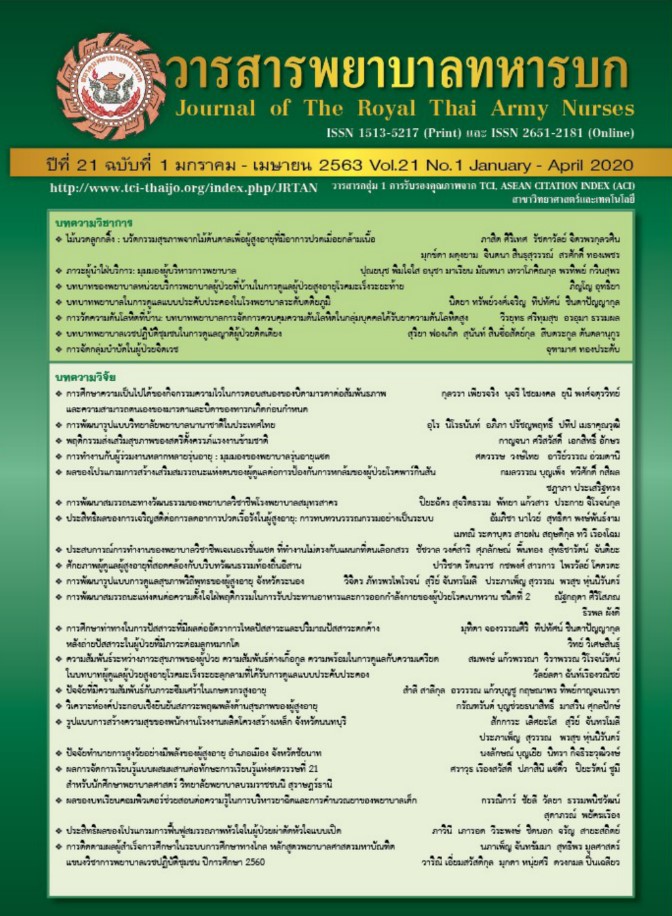The Effect of Blended learning Management on 21st Century Learning Skills For Nursing Students, Boromarajonani College of Nursing, SuratThani
Keywords:
Blended learning, 21st century learning skillsAbstract
The objectives of this semi-experimental research (Quasi-experimental research) are to study the level of learning skills in the 21st century after blended learning management and to study the satisfaction of nursing students towards the usage of blended learning. The sample group consisted of 134 first-year nursing students from Boromarajonani College of Nursing, Suratthani, who enrolled in the Nursing Communication and Information Course.The research instruments were the 21st century learning skills assessment form and the satisfaction questionnaires of nursing students who studied by using blended learning. The data were analyzed using frequency distribution, descriptive statistics and pair t-test The result of the research indicated that 1. Nursing students had higher 21st Century Learning Skills in all aspects, after studying with blended learning than before using the learning model and its statistical significance is at .01. 2. Students were satisfied with the blended learning, which is divided into 2 issues: the overall satisfaction of teaching and learning in the classroom is at the highest level with an average value of 4.59 (SD = 0.57) and the overall satisfaction of teaching and learning through the network system is at the highest level with an average value of 4.69 (SD = 0.58)
Downloads
References
2. Sukiem P. The Result Of Blended Learning A Topic Of Civism For Prathomsuksa 5 Students. Master’s thesis, Rajamangala University of Technology Thanyaburi. 2012. (in Thai)
3. Khoochonthara P, Lohitwisas S, Chanachai R, On-ming R. Evaluate The Effectiveness Of Blended Learning And Flexible Learning Model To Promote Lifelong Learning For Working-Age Adult. VRU Research and Development Journal Science and Technology. 2014. 9(1): 55-63. (In Thai)
4. Chantra R, Sarakshetrin A. Learning Skills in 21st Century of Nursing Students at Boromarajonani College of Nursing, Suratthani. The Southern
College Network Journal of Nursing and Public Health. 2017. 4(1) :180-190 (In Thai)
5. Saraketrin A., Rongmuang D., Chantra R, Nursing Education in the 21st Century: Competencies and Roles of Nursing Instructors. Journal of The Royal Thai Army Nurses. 2019. 20(1):12-20. (in Thai)
6. Songwatthanayuth P, Polin S, The Curriculum for Nursing Students in the 21st Century: Case Study and Transformative Learning. Journal of
The Royal Thai Army Nurses. 2019. 20(2):10-16. (in Thai)
7. Sadhuwong K, Koraneekij P, Natakuatoong O, Effects of A Blended Learning Model Integrating Situated Multimedia Lessons and Cognitive Apprenticeship Method on The Clinical Reasoning Skills of Nursing Students. Journal of Health Research. 2016. 30(6):426-431. (in Thai)
8. Yimyam S, Charuwatcharapaniskul U, Chareonsant J, Indarangkura Na Ayutthaya A, Xuto P, Chaloumsuk N. Developing on Blended Learning for Developing the 21st Century Learning Skills. Nursing Journal. 2015. 42 (extra): 129-140 (In Thai)
9. Onsri P. An Instructional Model for Enhancing 21st-Century Learning Skills among Army Nursing Students. Journal of The Royal Thai Army Nurses. 2018.19(3): 147-157. (In Thai)
10. Pongauksorn P. Learning in The 21st Century : Lesson Learned from Flipped Classroom. Journal of The Royal Thai Army Nurses. 2018.19(2): 47-54. (In Thai)
11. Dowling, Carlin & Godfrey, Jayne & Gyles, Nikole. (2003). Do hybrid flexible delivery teaching methods improve accounting students’ learning outcomes?. Accounting Education. 12. 373-391
12. Rodmeum N. A development of blended learning model using research-based learning to encourage the scientific mind for undergraduate
students. Journal of Education Naresuan University. 2011. 13(extra): 63-81 (In Thai)
13. Khonsue C, Krootjohn S, Wararatpanya K. Development of Activity Blended Learning Model on System Analysis and Design Course. Journal of Library and Information Science SWU. 2010. 4(1) :40-52 (In Thai)
Downloads
Published
How to Cite
Issue
Section
License
บทความหรือข้อคิดเห็นใดใดที่ปรากฏในวารสารพยาบาลทหารบกเป็นวรรณกรรมของผู้เขียน ซึ่งบรรณาธิการหรือสมาคมพยาบาลทหารบก ไม่จำเป็นต้องเห็นด้วย
บทความที่ได้รับการตีพิมพ์เป็นลิขสิทธิ์ของวารสารพยาบาลทหารบก
The ideas and opinions expressed in the Journal of The Royal Thai Army Nurses are those of the authors and not necessarily those
of the editor or Royal Thai Army Nurses Association.






